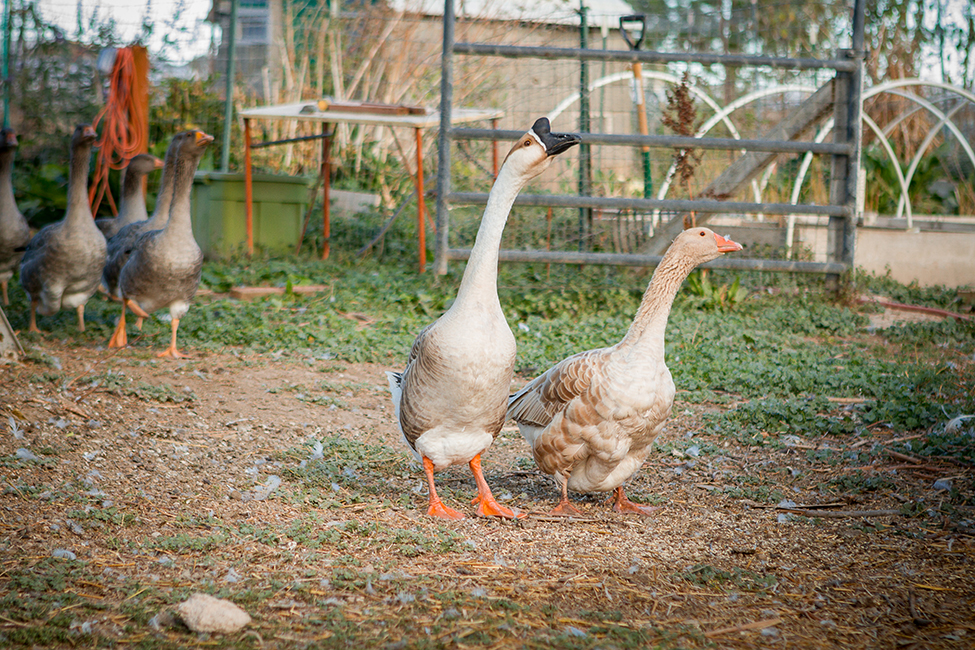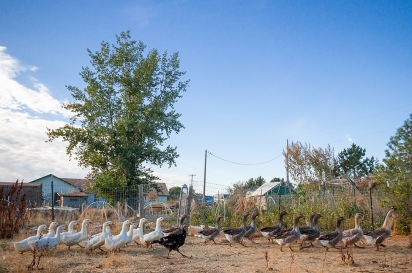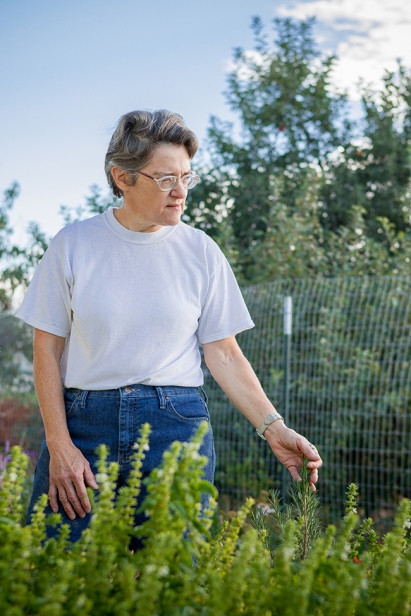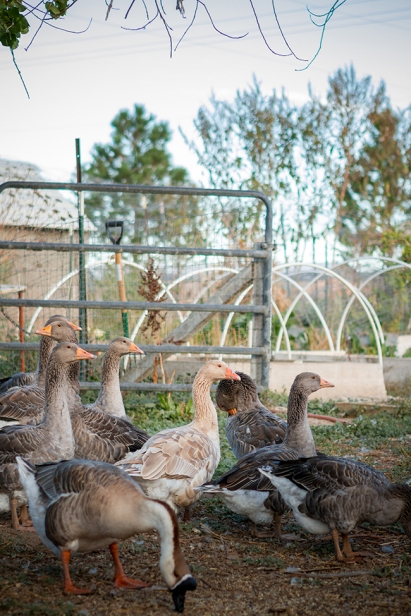Fowl Fare: Local Duck Wranglers Find Eager Buyers
At a Pilgrimage to Canterbury–themed feast hosted by Nancy Parker, owner of Blessed Earth Herb Farm and member of the Society for Creative Anachronism, plates were piled high with root vegetables, stewed fruit with cream and glistening, roasted duck. But once the goblets were drained and the dishes cleared, Parker’s taste for duck hadn’t been sated.
In order to save money, Parker had raised ducks for the feast on her acre-and-a-third property in Caldwell, where she also grows herbs and tends laying hens, turkeys and meat chickens. In 2013, she decided to wade into the duck-rearing waters, raising 10 ducks for Idaho’s Bounty. And this year, she’s increased that number considerably.
“I brought in 50 ducklings and they are half grown and they are intimidating my friend’s dog by doing the 100-legged-beast arrangement, where they all move together,” laughed Parker.
Though 50 ducks is a relatively small number, it’s a big step forward for fans of local fowl. While a number of Boise farmers sell meat chickens, local ducks have been much harder to come by. And Parker isn’t exactly sure why more people don’t raise them.
“They might find them to be a nuisance?” Parker pondered. “Their coop is rather messy and they will get into things, but so will chickens. If you raise poultry, you have to accept that you’re going to have a mess.”
Parker says her ducks feed on all kinds of “green stuff,” mowing down whatever pastures they’re put in.
“I give them organic grain and peas, just like I do my chickens as a supplement, but then they’re free-ranging all over the place,” said Parker. “They are the one thing that I raise that will actually eat my yellow dock. They like burdock leaves … they love grass and they eat buttonweed and just about anything else they can lay their beaks on.”
But Parker says ducks also require an additional investment that chickens don’t: a pool of water.
“They really do need to have some access to water for their best health; not everybody has a pond or anything for them to get into,” said Parker.
At six weeks old, Parker’s ducks splashed about in a baby wading pool, while she waited for a larger pond she’d dug to be lined and filled with water. As Parker explained, ducks raised from a hatchery can’t swim right away.
“When you get ducks from a hatchery, they’re not waterproof,” said Parker. “If they hatch under their mama, her feather oils get all over them and she can take them into the pond immediately. But if you get them from the hatchery, they will waterlog and sink and drown if they go in water. … They don’t become waterproof until they’re got their adult feathers; then they get their own oil glands.”
But perhaps the most prohibitive factor in raising ducks locally is the cost. Not only do ducklings cost around $4 each at Dunlap Hatchery, but they’re also expensive to butcher.
“Among other things, the processing is more than twice that for processing a chicken because of the pin feathers,” said Parker.
At Home Grown Poultry in New Plymouth, it costs $10 to process a duck versus $5 for a chicken. Because ducks have so many layers of feathers, Homegrown Poultry has to employ a time-consuming waxing method to completely de-feather them.
Farmer Mike Heath, of M&M Heath Farms in Buhl, has also decided to dabble in ducks this year. Heath, who already provides chickens to Bittercreek Ale House, contracted with the gastropub to raise ducks specifically for them.
“They kept hounding me to do it so I decided, ‘Well, I can try it,’” said Heath.
Heath is currently raising around 50 ducks for Bittercreek, which will eventually wend their way into dishes like the decadent Ducktine, which features duck confit ladled on spaetzle fries with local cheese curds and a duck demi-glace.
Heath runs a certified organic operation, so he feeds his ducks a mix of organic grains that he grows himself.
“I feed them chick starter to start with … I have my own organic grain that I grind up, so I’m starting to mix that in with their feed,” said Heath. “Right now it’s wheat and corn. There will be times when there will be barley in there.”
At the five-week mark, Heath hadn’t run into any major difficulties with his ducks. But he still thinks of the enterprise as a trial run.
“Right now, I consider it an experiment and we’ll see if Dave [Krick, owner of Bittercreek] can afford to buy them,” said Heath, chuckling.
But despite the relatively high price tag—Parker charges around $5 a pound for her duck—demand is still high. According to Idaho’s Bounty, a number of area restaurateurs are on the hunt for locally raised duck.
“Idaho’s Bounty told me they could’ve sold a heck of a lot more than I had, which is why I ordered in more this year,” said Parker. “They said, ‘We’ve got restaurants that would be very happy to have them locally raised instead of ordering them in from California,’ which is where they’re having to get organically raised ducks.”
One of those chefs is Richard Langston, owner of the recently renamed Richard’s Café Vicino, an Italian-influenced restaurant in the North End. Langston has only been able to feature locally raised duck on his menu a handful of times, most recently in the form of a slow-cooked duck ragu spooned over pasta.
“I’ve only ever used them for specials because I can’t seem to get enough of it to put on my menu to have enough inventory,” said Langston. “I’d probably use more of it if it were available.”







